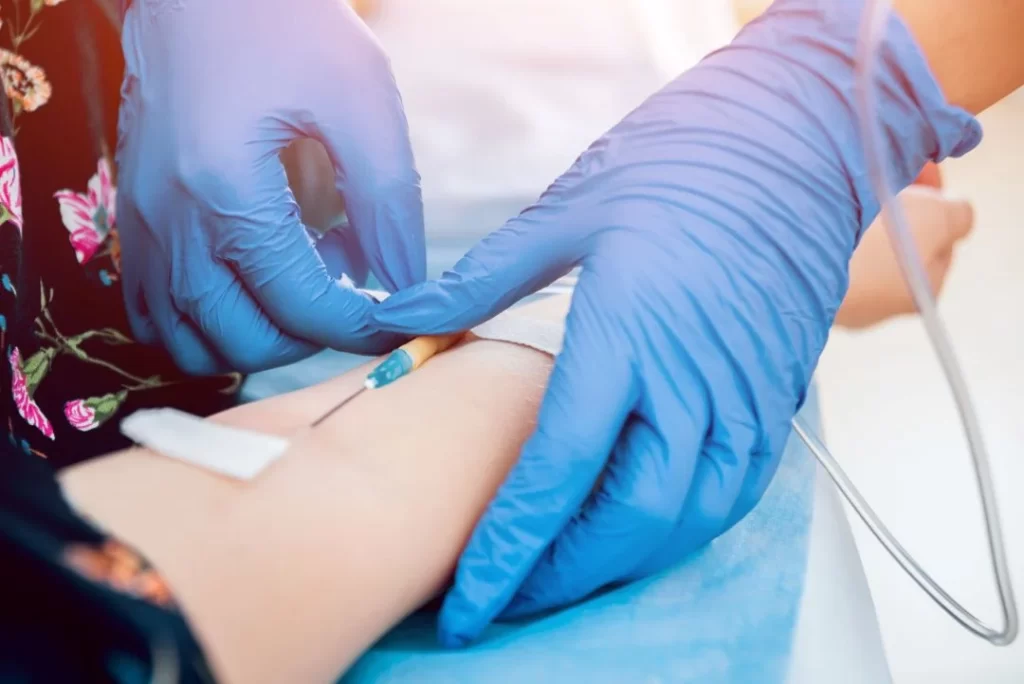Does IV Therapy Work For
Weight Loss
IV Therapy, a method of administering essential nutrients intravenously, has gained significant popularity for various health purposes. From boosting energy levels to aiding in detoxification, IV Therapy has been touted as a potential solution for several wellness concerns. This blog delves into the specific claim: “Does IV Therapy work for weight loss?” We will examine the link between IV Therapy and weight management, exploring how it allegedly helps shed those extra pounds. By analyzing scientific evidence and expert opinions, we aim to provide an informed perspective on the effectiveness of IV Therapy in weight loss.
What is IV therapy, and how does it work?
IV therapy is a fast and effective way to deliver fluids and nutrients to the body, bypassing the digestive system, which can slow down the absorption process. By directly introducing substances into the bloodstream, the body can quickly and efficiently utilize the nutrients, making IV therapy an attractive option for individuals with nutrient deficiencies or seeking immediate relief from specific symptoms.
How Does IV Therapy Work?
The IV therapy process typically involves the following steps:
- Medical Assessment: A qualified healthcare professional will conduct a thorough medical assessment before undergoing IV therapy to determine if the treatment suits the individual. They will review the patient’s medical history, current health status, and specific concerns to customize the IV formulation.
- IV Formulation: Based on the assessment, a specialized IV formulation is prepared, containing a combination of fluids, vitamins, minerals, antioxidants, and sometimes medications tailored to meet the patient’s needs. Common nutrients used in IV therapy include vitamin C, B vitamins, magnesium, calcium, and amino acids.
- IV Insertion: The patient is seated or lying comfortably, and a sterile needle is inserted into a vein, usually in the arm. The needle is then attached to a tube connected to an IV solution bag.
- IV Infusion: The IV solution is slowly and steadily infused into the bloodstream over a specific period, ranging from 30 minutes to a few hours, depending on the treatment plan.
- Monitoring: During the infusion, the healthcare provider monitors the patient’s vital signs and adjusts the IV flow rate to ensure safety and optimal absorption.
Benefits of IV Therapy
IV therapy offers several potential benefits, including:
- Rapid Rehydration: IV therapy is effective for quickly rehydrating the body, making it valuable for individuals with dehydration due to illness, intense physical activity, or excessive alcohol consumption.
- Nutrient Replenishment: It can efficiently deliver essential vitamins and minerals, aiding individuals with nutrient deficiencies or malabsorption issues.
- Enhanced Wellness: Some people seek IV therapy to boost their immune system, increase energy levels, and improve overall well-being.
- Support for Specific Conditions: IV therapy can complement medical treatments for migraines, chronic fatigue, and fibromyalgia.
IV therapy is a valuable medical procedure for targeted relief but requires qualified healthcare professionals for safety and effectiveness. Consult a healthcare provider to determine if it suits your specific needs.
How Nutrient Deficiencies Can Impact Weight Loss Efforts
Weight loss efforts often focus on reducing caloric intake and increasing physical activity. However, proper nutrition and nutrient deficiencies can significantly impact weight loss efforts. Addressing these deficiencies is crucial for sustainable and effective results.
- Slowed Metabolism: B vitamins and minerals are essential for supporting metabolic processes, but lack can slow metabolism, hindering weight loss progress and reducing calorie burn at rest.
- Increased Fat Storage: Omega-3 fatty acids regulate fat storage and metabolism, causing deficiency, increasing visceral fat storage, and increasing chronic disease risk.
- Energy Depletion: Deficiency in iron, vitamin B12, and other nutrients can cause fatigue and weakness and hinder weight loss through regular physical activity.
- Disrupted Hunger Signals: Nutrient deficiencies disrupt hunger signals, causing overeating and sabotaging weight loss efforts by affecting fiber and protein intake.
- Muscle Loss: Protein is crucial for maintaining lean muscle mass, preventing muscle loss, and enhancing metabolic rate for weight loss.
- Increased Cravings: Nutrient deficiencies, particularly essential vitamins, and minerals, can increase cravings for unhealthy and calorie-dense foods. This can create a vicious cycle of overeating and hinder progress toward weight loss goals.
- Poor Nutrient Absorption: Nutrient deficiencies may arise from health conditions like celiac disease or inflammatory bowel disorders, impacting weight loss efforts.
Addressing Nutrient Deficiencies for Weight Loss Success
- Balanced Diet: Consume a well-rounded diet that includes a variety of nutrient-dense foods such as fruits, vegetables, whole grains, lean proteins, and healthy fats.
- Nutritional Supplements: If you suspect a nutrient deficiency or have specific dietary restrictions, consider consulting a healthcare professional and incorporating supplements to meet your nutritional needs.
- Regular Health Checkups: Regular health checkups and blood tests can help identify any nutrient deficiencies and allow for timely intervention.
- Personalized Approach: Recognize that each individual’s nutritional needs are unique. Working with a registered dietitian or nutritionist can help create a personalized plan to address nutrient deficiencies and support weight loss goals.
Nutrient deficiencies impact weight loss efforts, affecting metabolism, energy, and hunger signals. Prioritizing proper nutrition and addressing deficiencies optimizes the weight loss journey, combining a balanced diet, regular physical activity, and adequate nutrient intake for long-term success.

The Role Of Energy Levels In Weight Loss
Many weight loss journeys focus on cutting calories and increasing physical activity, neglecting energy levels, influencing motivation, food choices, and healthy lifestyle adherence. Optimizing energy levels is crucial for sustainable and effective results.
- The Energy Balance Equation: Weight loss relies on the energy balance equation, involving energy intake and expenditure. Achieving and maintaining a sustainable calorie deficit depends on energy levels and calorie burn.
- Physical Activity and Energy Levels: Regular physical activity boosts energy levels, releases endorphins, and improves mood, motivation, cardiovascular health, endurance, and overall fitness, contributing to increased energy throughout the day.
- Energy Levels and Food Choices: Energy levels impact food choices and eating behaviors. Fatigue leads to sugary, high-calorie foods, potentially causing weight gain. Stable energy levels promote healthier choices and nutrient-dense foods for weight loss.
- The Impact of Sleep: Poor sleep quality and duration can cause fatigue, reduced energy, and disrupt hormones controlling hunger and appetite, potentially causing weight gain.
- Managing Stress and Cortisol Levels: Chronic stress increases cortisol levels, leading to appetite, abdominal fat accumulation, fatigue, and decreased energy. Effective stress management techniques like meditation, yoga, and nature support weight loss.
- Balanced Nutrition for Sustained Energy: A well-balanced diet with complex carbohydrates, lean proteins, and healthy fats is crucial for energy levels, blood sugar stability, and weight loss while avoiding refined sugars and processed foods.
Optimize energy levels through regular physical activity, sleep, stress management, and a balanced diet to support weight loss efforts and achieve long-term success in weight loss.
How Iv Therapy Can Complement Diet, Exercise, And Lifestyle Changes
Embracing a healthier lifestyle involves modifying diet, exercise, and habits. IV therapy, a complementary treatment, can support these changes and improve progress. It can enhance the effects of efforts for a healthier and happier life.
- Replenishing Nutrient Deficiencies: IV therapy can help individuals address nutrient deficiencies caused by poor absorption, medical conditions, or busy lifestyles, ensuring optimal nutrient levels for weight loss and overall health.
- Boosting Energy Levels: IV therapy can boost energy levels during lifestyle changes by delivering nutrients directly to the bloodstream, promoting motivation and commitment to exercise, resulting in more consistent and productive workouts.
- Supporting Muscle Recovery and Performance: IV therapy supports muscle recovery and performance by reducing post-workout soreness and improving hydration. Formulations containing amino acids and antioxidants aid recovery, promoting faster recovery and fitness routine stickiness. Proper hydration enhances exercise performance, appetite control, and detoxification.
- Managing Stress and Mood: Lifestyle changes can cause stress and anxiety. IV therapy can help reduce stress and promote relaxation while boosting immune function with nutrients like vitamin C and zinc. Healthcare professionals can customize IV formulations to suit individual needs and goals, ensuring the proper nutrients and support for effective diet, exercise, and lifestyle changes.
IV therapy improves well-being by addressing nutrient deficiencies, boosting energy, and supporting muscle recovery. Consult healthcare professionals for sustainable lifestyle changes.

The Importance Of Consulting A Healthcare Professional
Seeking healthcare professional advice is crucial for maintaining health and well-being, whether dealing with a specific issue, considering treatment, or embarking on a wellness journey.
- Expertise and Knowledge: Healthcare professionals possess extensive education and training, providing accurate, reliable information on the human body, health conditions, treatment options, and preventive measures.
- Personalized Assessment: Healthcare professionals conduct personalized assessments of individual health needs, considering factors like medical history, lifestyle, family history, and current conditions, identifying risks, and recommending optimal outcomes.
- Proper Diagnosis and Treatment: Self-diagnosing online can be dangerous; healthcare professionals can accurately diagnose health conditions using clinical assessments, tests, and tools for effective treatments.
- Guidance in Lifestyle Changes: Seeking healthcare professional guidance is essential for lifestyle changes like exercise and diet, as they offer personalized advice, safe practices, and monitoring progress, ensuring success and minimizing injury risks.
- Safe and Informed Decisions: Seeking healthcare professional guidance is essential for lifestyle changes like exercise and diet, as they offer personalized advice, safe practices, and monitoring progress, ensuring success and minimizing injury risks.
- Monitoring and Follow-up Care: Healthcare professionals offer continuous monitoring, follow-up care for chronic conditions, managing side effects, and adjusting treatment plans for long-term health goals.
- Preventive Care: Regular checkups and preventive care are crucial for maintaining good health and preventing future issues through screenings, immunizations, and assessments.
Consult a healthcare professional for accurate diagnosis, evidence-based treatment, personalized advice, and ongoing care to ensure optimal health and well-being. Prioritize your health and seek expert guidance for any health-related concerns or questions.
Struggling to Lose Weight? Unsure if IV Therapy Works for Weight Loss? Weight loss can be challenging, and finding effective methods to shed those stubborn pounds can feel overwhelming. With countless options available, it’s hard to know what truly works. You may have heard about IV Therapy’s potential for weight loss but remain skeptical about its effectiveness. Are the claims too good to be true? Can IV Therapy help you achieve your weight loss goals?
Contact us at (845) 579-5728 or visit our website for personalized guidance and expert advice on IV Therapy for weight loss. Our qualified healthcare professionals can assess your needs, discuss the latest scientific evidence, and help you determine if IV Therapy is a suitable addition to your weight management plan. Take the first step towards a healthier and happier you today!



